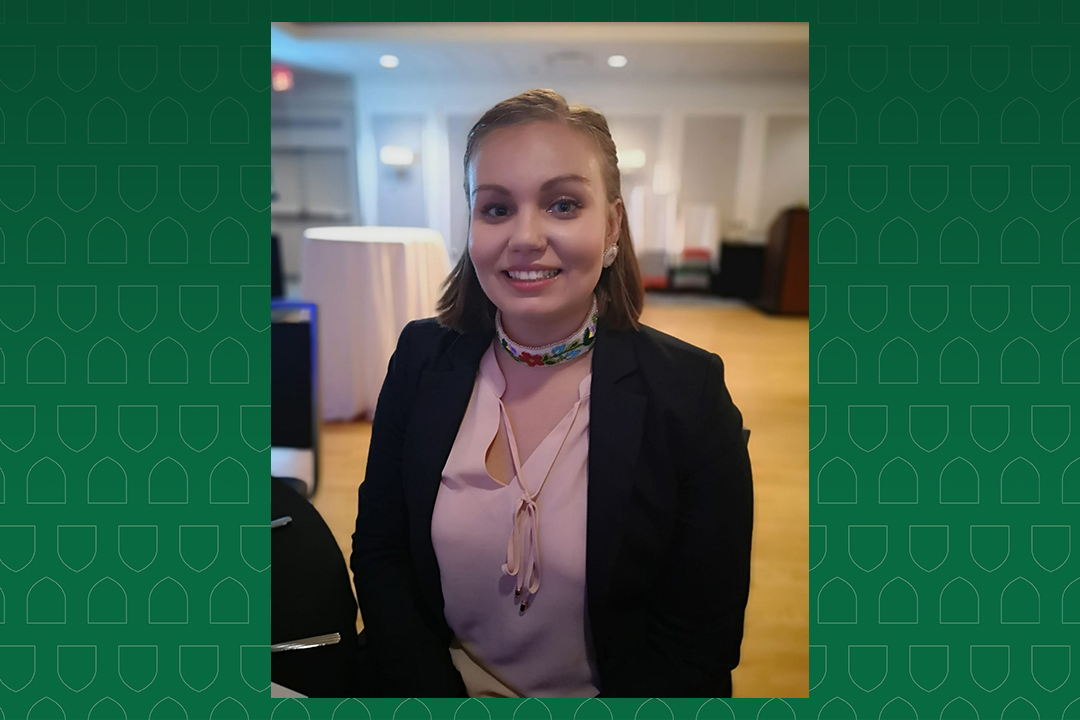
Graduate brings Indigenous perspective to the veterinary world
As Dayle Poitras-Oster begins her first career job, the Western College of Veterinary Medicine (WCVM) graduate is happy to return to the busy mixed animal practice in Drayton Valley, Alta., where she’d previously worked as a summer student.
By Lynne Gunville“It’s the first time I’ve been settled into a job and it’s not a step forward to something else,” says Poitras-Oster. “I like working in a mixed animal clinic with the different species, and you learn faster when you’re in charge. Every appointment is different, and that keeps the job interesting.”
Poitras-Oster appreciates the support she receives from all of the clinic staff at Rocky Rapids Veterinary Service, which includes five other veterinarians. She feels a particular affinity with Dr. Savannah Howse-Smith, a 2013 WCVM graduate who shares her Métis background and her goals as a Métis veterinarian.
Howse and Poitras-Oster are being featured in a reality show, Dr. Savannah: Wild Rose Vet, a television series that will follow the two veterinarians as they bring their unique perspective to treating animals, communicating with clients and forging relationships with Indigenous people.
“It’s about the human-animal bond,” says Poitras-Oster. “The series is about discovering identity and recognizing what Indigenous people bring to the veterinary world. It’s about bringing a different perspective to a veterinary practice and representing Indigenous populations who might want to include other practices such as traditional medicine.”
The series is a perfect fit for Poitras-Oster who has always embraced her Métis culture and is a tenacious advocate for First-Nation, Métis and Inuit people. During her three years of undergraduate classes at University of Alberta Augustana Campus, she volunteered and worked for the Augustana Aboriginal Student Services Office (now Indigenous Student Services), and she spent summers at Fort George and Buckingham House Provincial Historic Site where she taught visitors about Métis history and the fur trade.
When Poitras-Oster began classes at the WCVM, she was surprised at the lack of supports for Indigenous students, so she decided to do something about it. She approached the Western Canadian Veterinary Students’ Association about ensuring representation for Indigenous students.
By the following year, Poitras-Oster was elected Indigenous student representative — a new position aimed at changing attitudes toward the Métis, First-Nations and Inuit population while providing supports that helped Indigenous students to feel more comfortable and less isolated at the WCVM.
By organizing activities such as beading and crafting, window painting and baking bannock to sell at the college, Poitras-Oster worked tirelessly to promote awareness of her rich heritage.
“It was important to make the students aware of Indigenous culture through events that were available to everyone,” says Poitras-Oster. “One of the best activities was window painting. The students drew pictures representing what Indigenous relations and culture meant to each person. The art was on display for everyone to see, and students could walk by and see how beautiful it was.”
Poitras-Oster is proud of the position that she created, and she hopes to see more engagement in the future — changes such as adding an Indigenous adviser and establishing a defined space where Indigenous students can go to seek help and to connect with each other.
She emphasizes the importance of acknowledging mental health issues and helping students to cope with their heavy workload and their isolation from the supports of home. Poitras-Oster often found it difficult to juggle all of her obligations, particularly when she was the Indigenous student representative with the added responsibility of organizing activities while keeping up with labs and classes.
She also felt disconnected from her home and her community, particularly when her grandfather was fighting cancer. He played a huge role in Poitras-Oster’s decision to pursue a veterinary career, and she says he was very proud of her progress. She describes him as her “best supporter and advocate,” and regrets that her grandpa passed away before he could see her graduate.
Poitras-Oster appreciated being able to reach out to WCVM staff such as Drs. Jennifer Loewen and Jordan Woodsworth when she needed advice. She enjoyed working with Dr. Andrew Allen, her supervisor for a summer job aimed at promoting science to Indigenous populations while engaging in cultural activities.
Gaining a better understanding of One Health and community health through classes in public health and epidemiology was also appealing to Poitras-Oster.
“I enjoyed learning about the importance of animals for human health and the impact of animals and humans on the environment,” she says. “In the future I’d love to have a mobile practice in an area where I could travel to reserves and settlements. The veterinarian becomes their public health expert.”
Once COVID restrictions have been lifted, Poitras-Oster looks forward to meeting clients in person as she gets to know the people of her new community. She also plans to become involved with the Métis Local in Drayton Valley, to volunteer and work with Indigenous people and to continue volunteering with the Alberta Spay Neuter Task Force (now known as the Canadian Animal Task Force).
“I’m passionate about people, and it’s great to get to know them and work with them,” says Poitras-Oster. “Field service is my favourite thing, and I love communicating with people and providing the veterinary care they need — that’s what means the most to me.”
Article re-posted on .
View original article.

